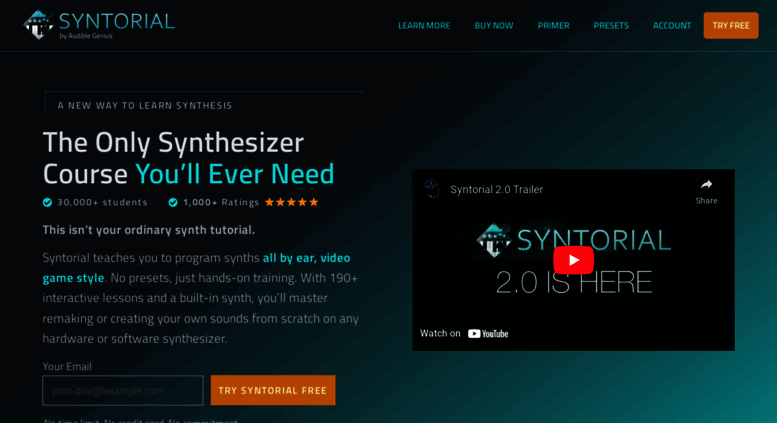

Probably more so because I'm spending the time to really learn them Just going through Z3ta with the tutorials reminds me how much I can do with the tools I already have.


Side note, I think I'm going to skip the Arturia collection. I'm excited to push through and keep learning, hopefully by the time I'm done, I will be much less of a preset surfer. For example, I started to make some pads with some real motion in them, almost sounded like it could be a preset! And not just the BS I did before where I do a simple filter sweep. Because it forces you to really spend the time listening and learning to each technique, the lessons really start to sink in. Sharke Kroneborge I'm up to section 9 now, and I'm really digging it. They each have their own website as well where you can buy more in depth courses. I've made a few nice evolving Boards of Canada style pads like this.
#Syntorial free crack#
And you invariably end up having a crack at it yourself and coming up with some neat little presets of your own. While it's sometimes a little annoying not to be told why they're adjusting a certain parameter - especially with the FM8 tutorials - you gain some insight into how the pros are approaching their sound design.
#Syntorial free how to#
It's a different style of learning than Syntorial, in that a lot of them show you step by step how to make a certain sound and you follow along on your synth. I get the updates from them on my newsfeed and there are often some nice little video tutorials. If you're on Facebook there are some great pages (all related) which offer tutorials in Massive, FM8, Reaktor, Absynth etc. Kroneborge I'm up to section 9 now, and I'm really digging it. If you want to get that sound in your head, Syntorial will teach you how. My overall impression is that Syntorial is a great tool and well worth the investment. The best part is that I've been able to quickly understand what I need to listen for to avoid repeating my previous mistakes, that means I get to get better at what I want to do. I plan on repeating the entire course until I ace it. Usually the lesson challenges and topic quizzes go pretty quickly but the group challenges can be "challenging", that's a good thing. For me, the challenges have had almost the perfect degree of difficulty, not so easy that I nail every one but not so hard that I haven't gotten close enough to understand what I missed. So far, I've gone through the first 10 topics (65 lessons). Syntorial is also well designed in that it makes it difficult, if not impossible, to cheat, not that you'd want to. This is also the model the military uses to train people for technical jobs, it is probably the most effective method ever devised for rapid training. The instant feedback model tells you right away exactly what you didn't get right the first time and allows you to redo a challenge until you are satisfied that you have a good grasp on the topic. The thing that sets Syntorial apart is that it's an ear training tool, the lessons, challenges, and quizzes train your ears to hear what the various elements of subtractive synthesizers do.
#Syntorial free free#
It also has a free Z3TA+ 2 module that explains the mapping of their synth to Z3TA+ 2 with accompanying challenges.

In all it has 33 topics, each covering an aspect of subtractive synthesis. The challenges cover the current lesson, quizzes cover the topic, and the group challenges cover everything you've learned up to and including the current topic.
#Syntorial free series#
It has a series of lessons where the different elements of subtractive synthesizers are explained and demonstrated followed by challenges, quizzes, and group challenges. Syntorial is an ear training tool based on the instant feedback model. I posted in another section about not being able to get exactly what I wanted from Z3TA+ 2 and someone recommended Syntorial: so I went to the site, bought a copy, and started going through the lessons.


 0 kommentar(er)
0 kommentar(er)
